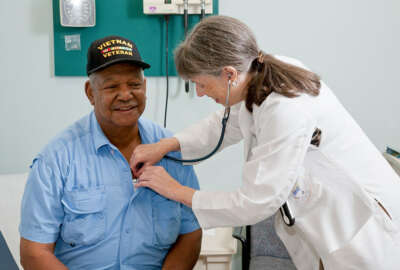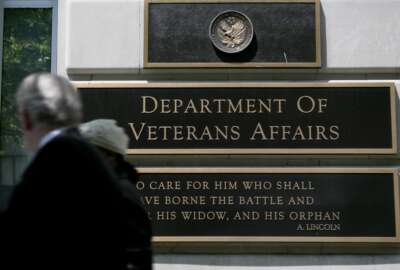VA hired 59,000 employees this fiscal year, but still struggles with workforce shortages
The Department of Veterans Affairs hired thousands of health care employees through a streamlined hiring process since the start of the COVID-19 pandemic. Now it's...
The Department of Veterans Affairs hired thousands of health care employees through a streamlined hiring process since the start of the COVID-19 pandemic.
The agency, however, is now limited to using the ongoing hiring authority for a small subsection of its hires, and is calling on Congress to make some of these hiring flexibilities permanent.
Agency executives told the Senate VA Committee on Tuesday that the agency is asking Congress to pass legislation that would keep this pandemic-era hiring flexibility in place permanently.
Senators agree the VA is taking too long to hire in-demand health care workers and is looking at legislation that would allow the agency to bring new hires on more quickly.
The agency is also looking to double the number of health care scholarships offered to new hires and is looking at ways to compete with the private sector on pay.
Gina Grosso, VA’s assistant secretary for human resource administration operations, security and preparedness, told the committee the VA has hired 59,000 employees since the start of the fiscal year.
The agency has a workforce of about 400,000 employees, and about 90% of employees work in health care.
Jessica Bonjorni, the chief of human capital management at the Veterans Health Administration, said VHA has about 31,000 candidates in its hiring pipeline right now.
“We’ve made a selection and we’re working to onboard them,” Bonjorni said, adding that VHA is holding hiring fairs and “onboarding surge events” over the coming week.
Despite this hiring surge, the VA continues to face a workforce shortage driven by a high rate of turnover. Bonjorni said the shortage in personnel has gotten worse since the start of the pandemic.
“Having not given it a rating previous to the pandemic, I’m going to say I would rate it at a seven right now,” Bonjorni said, referring to a scale out of ten.
Prior to the pandemic, that score would be “probably closer to four or five.”
“We have areas where we had isolated concerns, but now we’re seeing concerns across the country,” Bonjorni said.
Bonjorni said temporary authority from Congress to waive some hurdles in the hiring process has helped the agency staff up amid the COVID emergency.
President Joe Biden in February extended the COVID-19 national emergency declaration, but once that declaration expires, the VA will no longer have those hiring flexibilities.
“Earlier in the pandemic, all of our hires were COVID-related hires. Now we can only use it for a small subsection of our hires,” Bonjorni said.
Part of the problem is a lengthy time to hire. The average time to hire across VA is about 95 days.
Ralph Gigliotti, network director for the Veterans Integrated Services Network (VISN) in the Rocky Mountain area, said it’s taking 88 days on average to bring new hires on board.
“We’re very dependent on that nurse wanting to come work for VA because of the mission. We’ve done everything we can and we continue to do to make sure the pay is equitable in the work environment is equitable, but that speed of hire is an issue for us,” Gigliotti said.
The House VA Committee in March raised concerns about keeping the current streamlined hiring process, including temporary flexibilities on background checks, in place.
Committee Chairman Jon Tester (D-Mont.), however, said the VA has already hired thousands of employees under these COVID-19 flexibilities, and is calling on VA to tell Congress what it needs to improve hiring.
“We really do need to sit down and figure out what is the benefit and what is the cost to have all these regulations around hiring. Look, I don’t want an inept person at the VA. You guys don’t want an inept person at VA. But these are health care folks that you have thousands of. You already hired thousands of them. It ought not to be that tough. I need a list of things that we could do to make the hiring thing work,” Tester said.
Tester said he and Sen. John Boozman (R-Ark.) plan this week to introduce the VA Workforce Improvement, Support and Expansion (WISE) Act.
The legislation would increase pay and benefits for VA’s workforce, expand opportunities in rural VA facilities, support training for current and future VA clinicians and provide additional oversight of VA Human Resource operations and use of hiring authorities.
Tester said the VA was able to hire thousands of new staff last year, thanks in part to the authorities and funding included in the CARES Act and the American Rescue Plan.
“VA needs to continue that momentum to address its growing turnover rate and retention challenges, including employee burnout during this pandemic. We all know there’s a high demand for health care workers, but we also know that VA puts potential health employees through a long and burdensome hiring process,” Tester said.
Tester said the VA has not been maximizing bonuses and retention incentives for current employees, but Grosso said the VA has nearly maxed out its workforce budget.
“When you look at the end of the fiscal year, the money that we budgeted for people, we have almost spent all of it,” she said.
Carolyn Clancy, VA’s assistant undersecretary for health for discovery, education and affiliate networks, said the agency is seeking greater flexibility to offer retention and recruitment incentives to its workforce.
Clancy said the fiscal 2023 budget request seeks to double the amount of health professions scholarships awarded to doctors and nurses.
“We haven’t quite hit our ceiling, but we are coming very, very close. And given that the entire healthcare system is facing workforce shortages, and frankly given higher turnover rates, often deeper pockets entice some of our employees to leave,” Clancy said.
The VA has been able to recruit doctors and nurses through its Specialty Education Loan Repayment Program. The program offers student loan repayment to recent graduates enrolled or matched to a residency the VA considers in high demand.
Gigliotti said the program has helped his region recently hire three physicians in Sheridan, Wyoming, with a fourth in progress. He said the program is also attracting hires in Montana.
“Once they get exposure to VA, they tend to want to work for VA. And so a program like this of loan repayment has been very positive,” Gigliotti said.
Congress recently passed the RAISE Act, which sets higher pay caps for advanced practice registered nurses and physician assistants. VA Secretary Denis McDonough said the agency is also looking at raising pay caps for VA medical center directors and physicians.
“Our biggest concerns right now are at the higher end of the pay scale and the lower end,” Bonjorni said.
In addition to a shortage of entry-level nurses, Bonjorni also said the VHA is having a hard time hiring housekeeping aides, health technicians, food service workers and other hourly wage workers where the private sector offers higher pay.
Grosso said VHA efforts are underway to standardize HR processes to increase efficiency and address delays in the hiring and onboarding process. An HR modernization and shift to shared services earlier in the pandemic, she said, was a key factor in VHA’s ability to hire a surge of workers during the pandemic.
“While national policies have long existed for HR functions, variability in local processes has led to inefficiencies. This variability also makes it difficult to automate processes with modern information technology systems,” Grosso said.
Grosso said a VHA onboarding optimization team recently met to consider ways to reduce steps in the pre-employment and onboarding process.
Bonjorni said the VA is looking to standardize its human resources functions across the country, and empower regional offices to ensure the agency is offering pay high enough to attract in-demand health care workers.
“Our shift to regional human resources structures is really helping us see the entire market, so we can make those adjustments on a more swift basis,” Bonjorni said.
The VA, she added, has seen an increase of about 50% in the total number of salary adjustment requests across the country.
Biden last November signed the Hire Veteran Health Heroes, which directs the VA to recruit and hire Department of Defense medical personnel who are transitioning out of military service for open VA positions. Sens. Maggie Hassan (D-N.H.) and Mike Braun (R-Ind.) introduced the legislation.
Senators on the committee also raised concerns about the VA’s plans to close and consolidate facilities that no longer meet the health care needs of veterans.
Sen. Sherrod Brown (D-Ohio) said the VA’s recommendations to the Asset and Infrastructure Review Commission could have a chilling effect on hiring.
“The veterans and VA employees are concerned and medical professionals won’t apply because they think the hospital will close,” Brown said.
McDonough, however, said in March that the changes envisioned in the AIR Commission recommendations are “decades away” from being implemented.
“We’ve been very clear to message to our workforce that you’re critical now, and you’re going to be critical in the future, and that there will be a place for you. Anything that happens isn’t going to happen soon,” Grosso said.
Copyright © 2025 Federal News Network. All rights reserved. This website is not intended for users located within the European Economic Area.
Jory Heckman is a reporter at Federal News Network covering U.S. Postal Service, IRS, big data and technology issues.
Follow @jheckmanWFED






